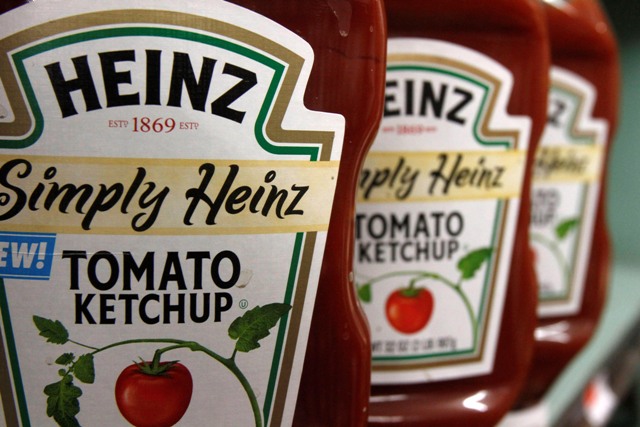
PITTSBURGH ICON– In this March 2, 2011 photo, Heinz ketchup is seen on the shelf of a market in Barre, Vt. H.J. Heinz Co. says it agreed to be acquired by an investment consortium including billionaire investor Warren Buffett in a deal valued at $28 billion. (AP Photo/Toby Talbot, File)
by Joe Mandak
Associated Press Writer
PITTSBURGH (AP) — A company with its roots in a teenager selling bottles of horseradish is now as much a symbol of Pittsburgh as steel.
The Pittsburgh Symphony Orchestra performs at Heinz Hall. The city’s regional history museum is named for the ketchup patriarch’s grandson, the late U.S. Sen. John Heinz. One of the city’s richest charities is fueled by the Heinz family fortune. Love-struck couples wait for months to be married at Heinz Memorial Chapel, the family’s Gothic limestone gift to the University of Pittsburgh campus.
And, of course, the city’s beloved Steelers play their home games at Heinz Field.
Those are just a few reasons why the $28 billion sale of the ketchup-making food giant H.J. Heinz Co. resonates so profoundly with Pittsburghers.
Under the deal with billionaire Warren Buffett’s Berkshire Hathaway and another investment group, the ketchup-fueled food conglomerate founded by Henry John Heinz will stay in the city where, nearly 150 years later, it would take more than just a corporate relocation to erase the Heinz legacy.
“Heinz ketchup is red gold in America and around the world,” said Andrew Masich, president and CEO of the Senator John Heinz History Center. The museum features a former Heinz plant’s ketchup-pouring neon sign on its roof.
“There’s nothing more powerful than that Heinz brand and I can’t blame anyone, Warren Buffett or anyone else, from wanting to capture a brand with that kind of strength,” Masich said.
Jeff Inman, a marketing professor and associate dean at Pitt’s Katz Graduate School of Business, agreed saying, “Heinz is an integral part of the cultural ethos of Pittsburgh.”
“Heinz and Pittsburgh go together,” Masich said. “They’re both solid American products, there’s integrity in the names that’s immediately recognized wherever you go around the world.”
Henry Heinz was born near Pittsburgh in 1844 to immigrants from Bavaria and began selling his mother’s garden leftovers at age 8 and his own bottled horseradish at 15. He founded Heinz & Noble Co. with a friend in 1869 and, though it went bankrupt, it was the precursor to the company that would open the H.J. Heinz Co. factory in 1890 and incorporate under that name 15 years later.
Henry’s son, Howard, would lead the company to worldwide prominence before he died of pneumonia in 1941, and Howard’s estate and that of Henry’s daughter-in-law Vira, would bankroll what is now The Heinz Endowments.
The $1.4 billion charity has given millions to fund everything from the preservation of subway murals by black artist Romare Bearden to, most recently, helping fund the Southwest Pennsylvania Environmental Health Project, which aims to study the health effects of Marcellus Shale gas drilling.
The charity has no ties to the company.
Heinz Chairman, President and CEO William Johnson tried to alleviate fears that the company’s sale might rupture its marriage to the city by noting that Buffet has promised not to move the company in a written sales agreement. The company will also maintain its naming rights deal with the Steelers’ stadium, among other commitments, Johnson said.
“Anytime you have a name like that that’s plastered all over the city, when something happens to it, it injects uncertainty, because it’s such a stable part of the community,” Inman said.
“Heinz is sitting in your pantry, when you open your refrigerator, there it is,” Inman said. “You don’t see Mellon and U.S. Steel in your refrigerator.”
Still, the professor believes it’s safe to assume Heinz will remain what it is to Pittsburgh because it’s not being gobbled up by another food conglomerate. Instead, it’s being purchased by investors with a track record of breathing new life into established brands, like See’s Candies and Geico, the insurance company represented by a talking gecko.
“Think of what Berkshire Hathaway does: They buy great brands that haven’t realized their potential and they help them realize it,” Inman said.